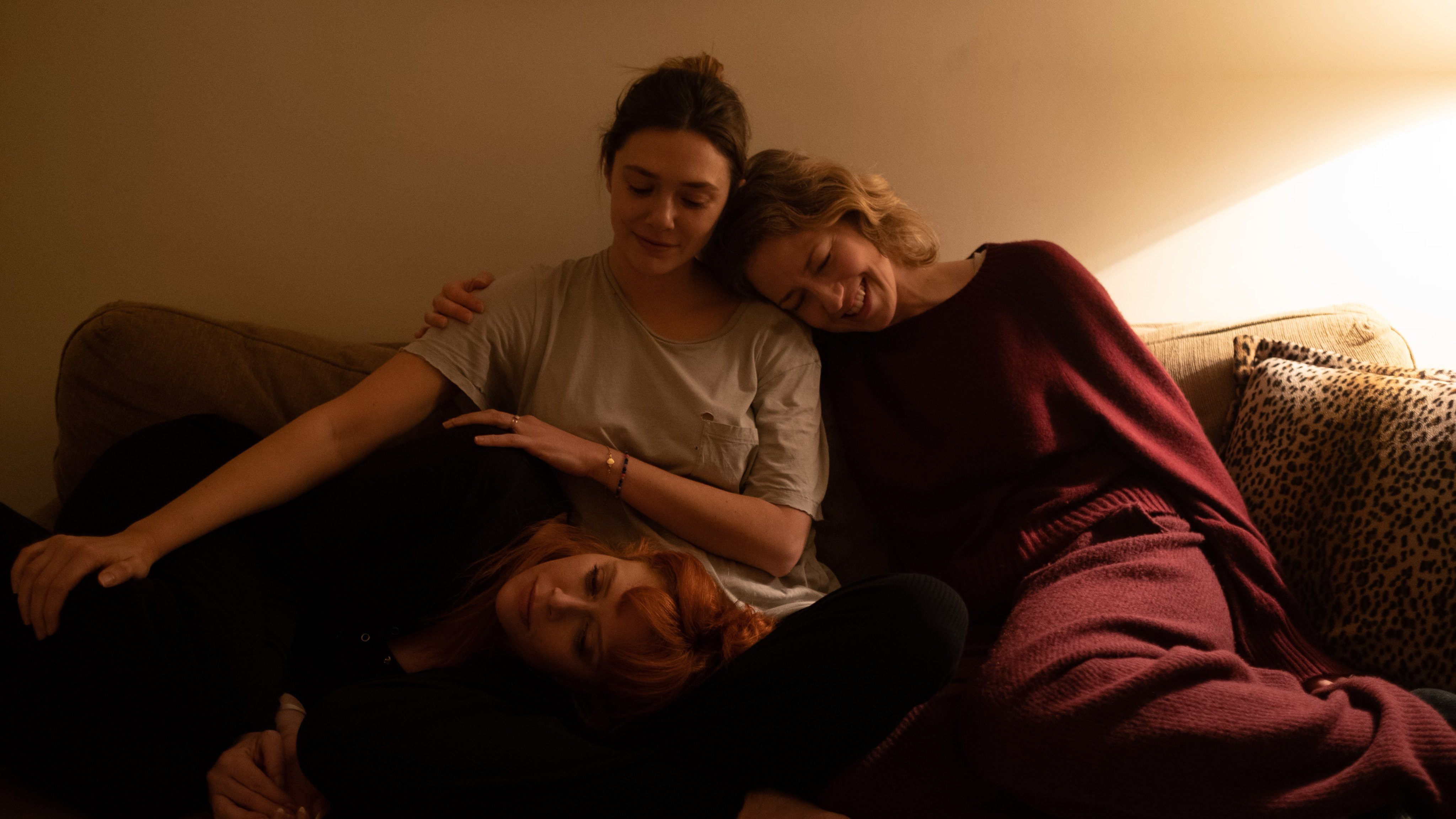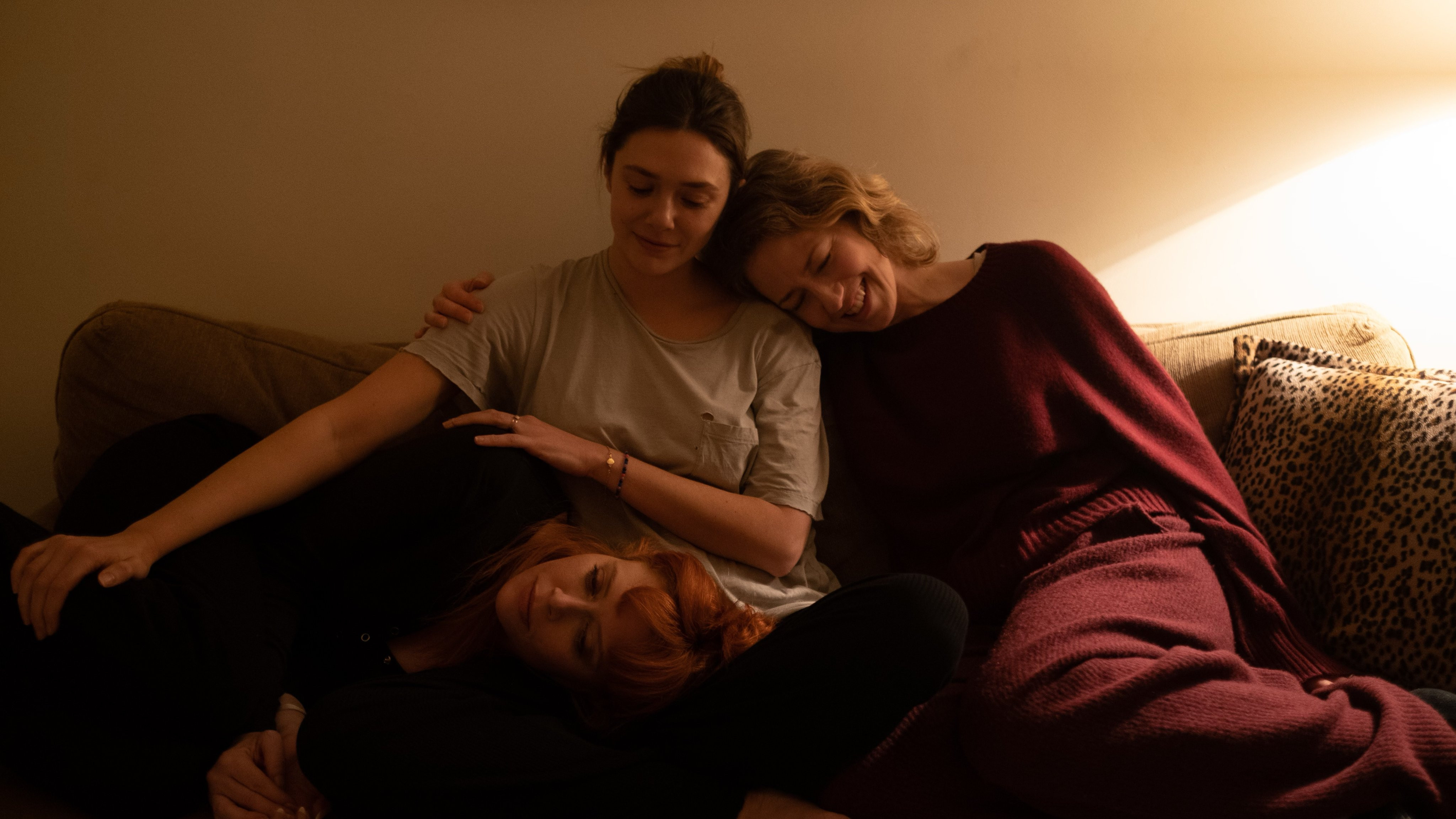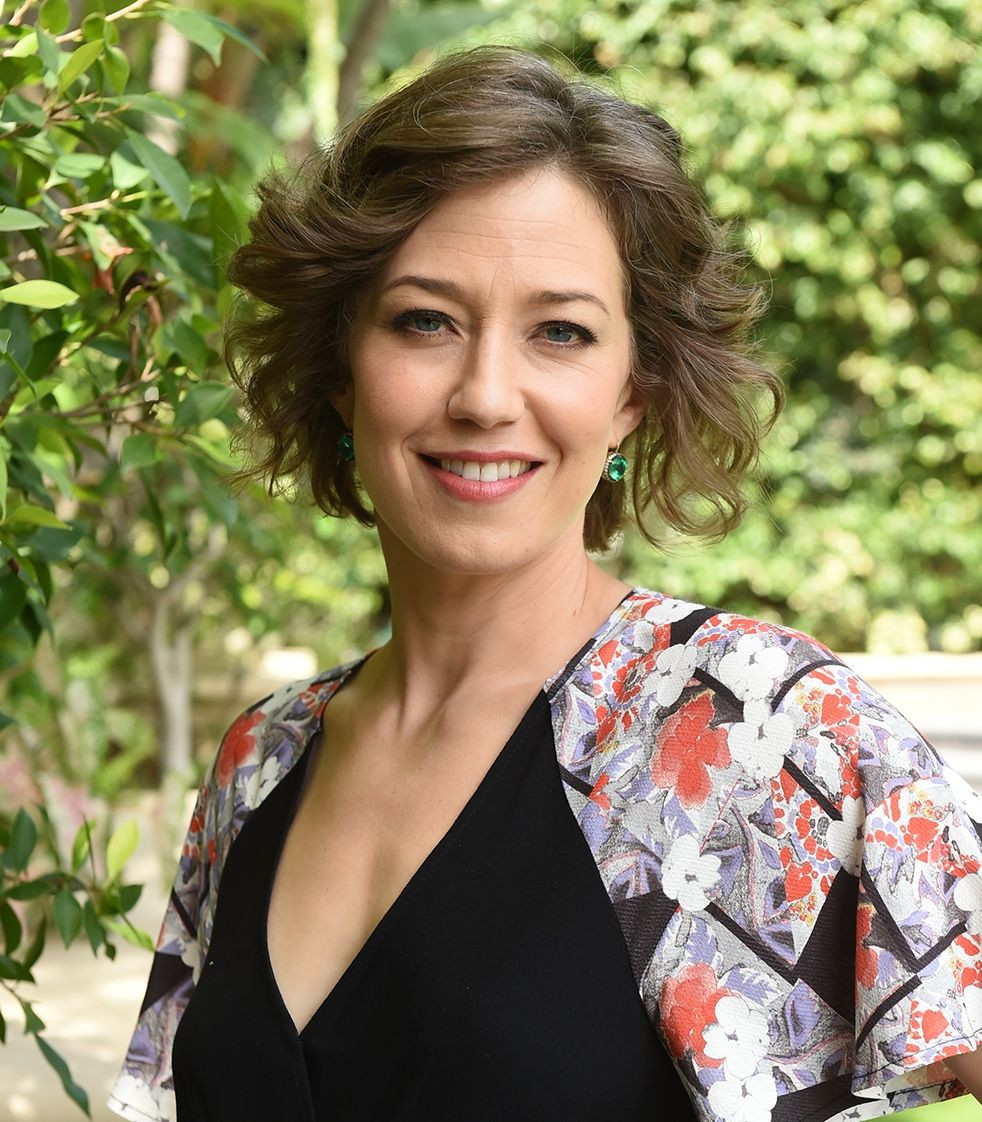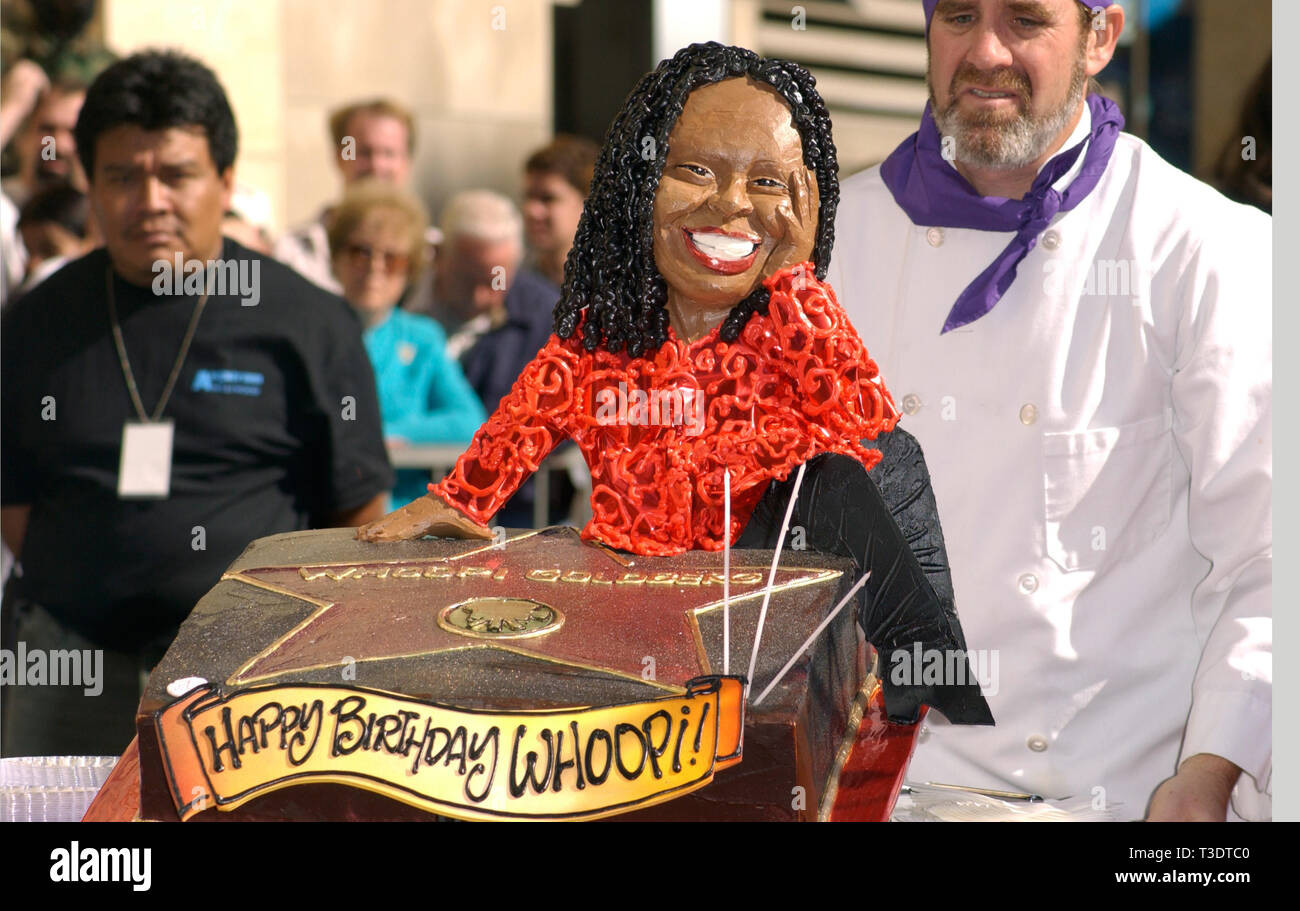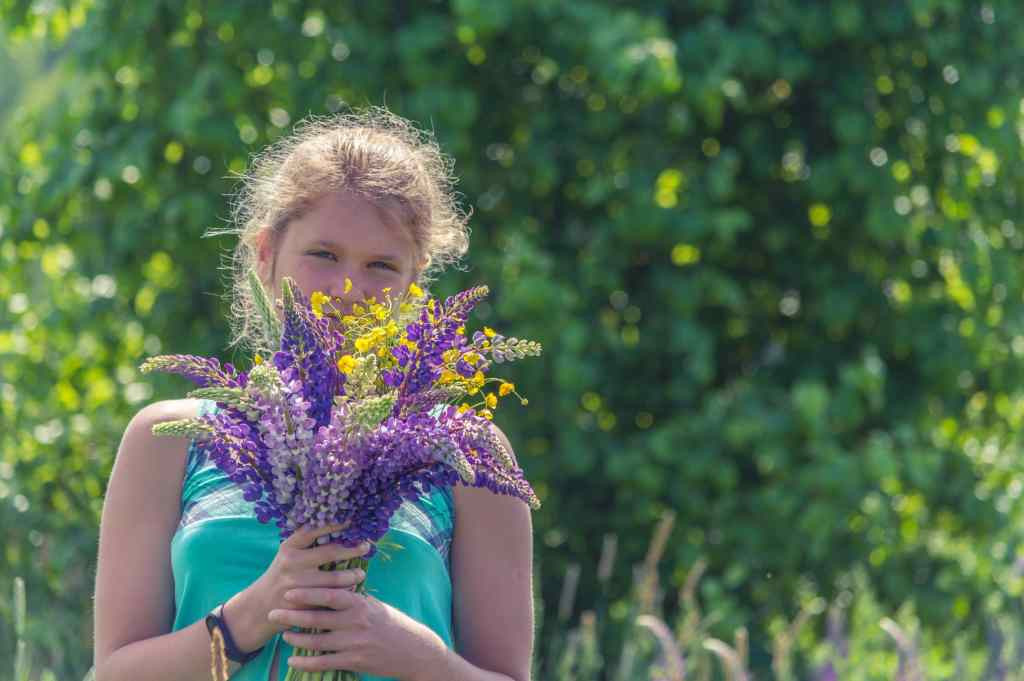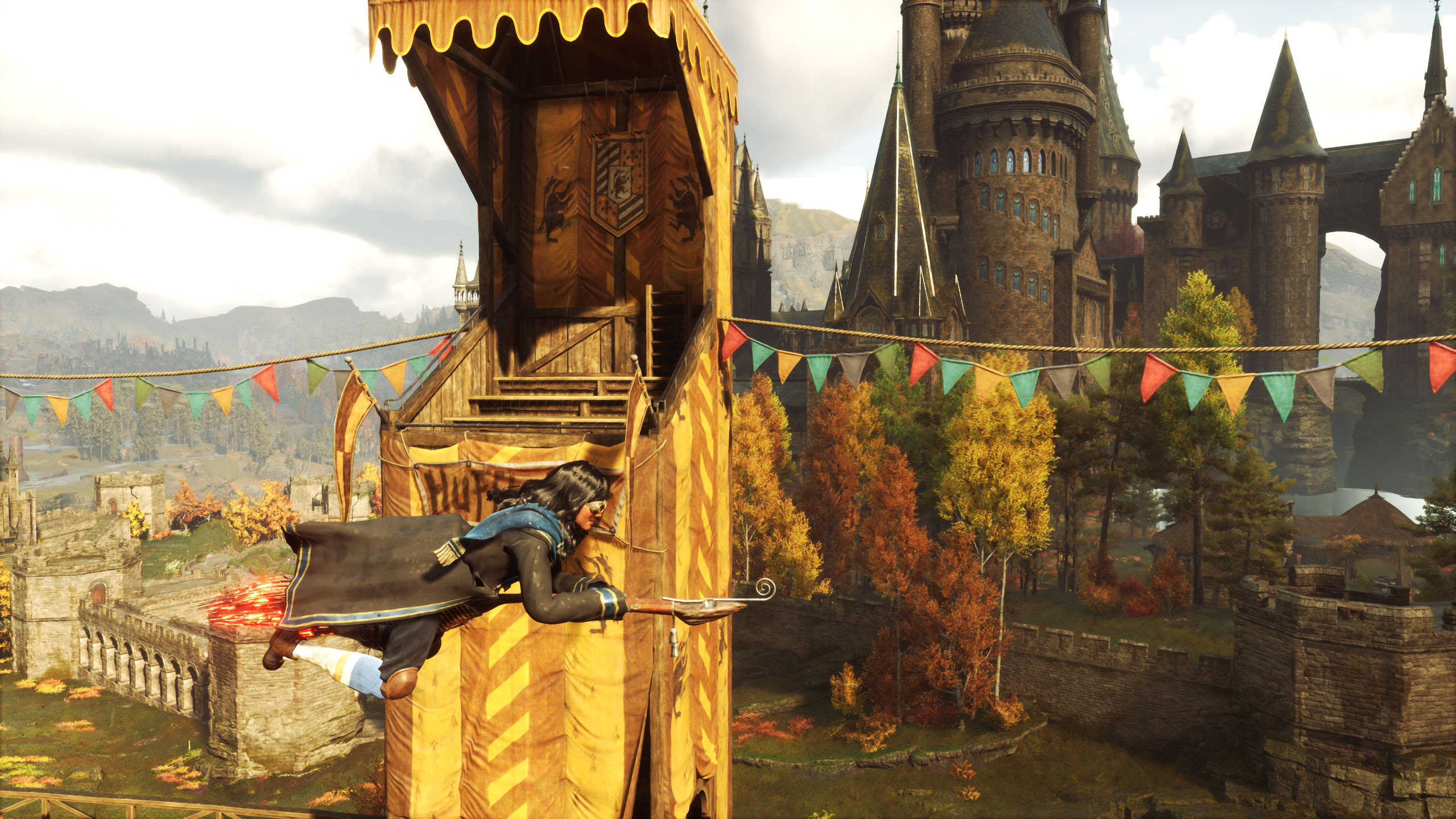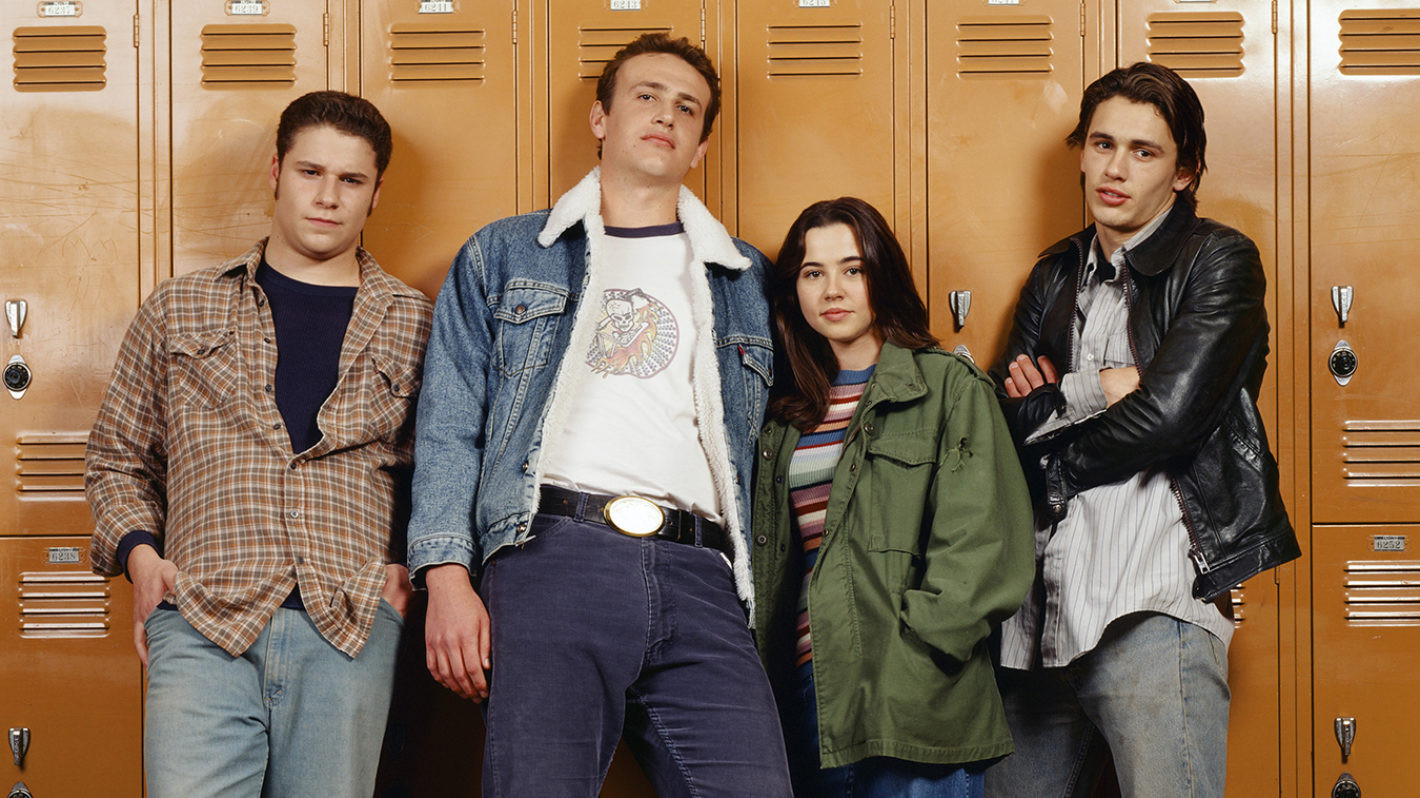Carrie Coon is only in London on a flying visit. A very short break from filming season three of The Gilded Age, Julian ‘Downton Abbey’ Fellowes’s hit HBO series set in New York’s 1880s boom years, for which Coon received another Emmy Award nomination and which she was convinced was about to be cancelled. “I told everyone it was over,” she says.
Coon welcomes us warmly, jumping up to offer us a glass of water – because you’re never too jetlagged to be polite. She knows Big Issue’s work. “We have something similar in Chicago, though not as substantial as this. And you’ve got lovely Chris Eccleston on the cover?” she says, glancing at a recent magazine featuring her on-screen brother from cult hit HBO series The Leftovers. “I love him so much. He’ll always be my brother.”
His Three Daughters, Coon’s new film, is a beautiful, singular depiction of grief and the preparation for grief in all its complexity and intensity. Co-stars Natasha Lyonne and Elizabeth Olsen join Coon as a dying man’s three semi-estranged daughters who reunite, awkwardly, in a small apartment for his final days in New York. It is written, directed and was meticulously planned by Azazel Jacobs.
“He first sent me a letter that said, I have this budget, we have this amount of time, we’re going to shoot it in order, and this is my vision,” says Coon. “Then he hand-delivered scripts to all of us, saying he had written it with us three in mind. It was extraordinary!
“The dynamics of the characters felt so real to me. It was very intentional about capturing how time feels in those moments when you step outside the rhythms of your life into this very specific vigil that’s unfolding to the metronome of these monitors in a back room. It’s this liminal space that’s out of time. You’re really just waiting. I think we all went through that a bit during the pandemic.”
It’s testament to Jacobs’s growing reputation – built via films including The Lovers (starring Coon’s actor-playwright husband Tracy Letts) – that the three leading actors signed up and Netflix came on board this intimate film – shot almost entirely inside one rent-controlled New York apartment.
“Anyone who’s done storefront theatre knows that creative restriction creates an energy that is quite liberating,” she says.
“It was almost like we made a home movie wherein Azazel could process the future, which would be the death of his parents, and that we were doing it for him. This wasn’t cobbled together with an eye toward commercial viability. It was a very personal and singular vision, lovingly executed. And therefore it was viable in the market. We’ve really gotten away from that. The machine has taken over, We’re building movies around algorithms not artistry.”
The setting pushes the three sisters, who are introduced almost as archetypes rather than characters before revealing their depths, together. Katie (Coon) is a super-organised, high-flying Brooklyn mom eager to take control of the situation (and her sisters), Christina (Olsen) is a free spirit, yoga practitioner and away from her daughter for the first time, while Rachel (Lyonne) is a reclusive, awkward stoner. She is also the one who had been living with their father throughout his illness before having her space invaded.
“We started behaving in a very intimate and sisterly way,” recalls Coon. “The three of us were confined to one sofa between scenes while everyone moved equipment from room to room. So we were just on each other’s laps. There was a physical intimacy but we also so respected each other’s work before we came into that room. And we were thrilled by the integrity of the process that the quick and dirty machine of TV does not always have. We came in wide open and ready to share.”
Carrie Coon is riding high. Before returning to The Gilded Age, she completed the hotly anticipated upcoming season of The White Lotus in Thailand in July. This year also saw her starring alongside Paul Rudd – plus Bill Murray, Ernie Hudson and Dan Aykroyd – in Ghostbusters: Frozen Empire, her second instalment in the franchise. But films like His Three Daughters, she knows, are rare.
“Even though you’ve had these big tent pole movies like Barbie and Tar with very strong, female led and driven storytelling, last year had the lowest number of female-led films in a decade in America,” she says.
“So we are talking a big game but it hasn’t actually changed that much. There isn’t that much film work for women, which is what makes a film like this even more extraordinary. You have Natasha at the height of her powers and Lizzie, who is always extraordinary but we haven’t even seen the best of what she has to offer yet. So it was such a gift.”
Next up is Nora Fiffer’s debut film Another Happy Day, which was filmed under vastly different conditions to most movies – including on-set childcare, something Charlotte Riley has led campaigning on for years.
“In America, we don’t have a lot of protection for families,” says Coon. “We’re offering families nothing. And the Republican project appears to be forcing women to have children without supporting us at all.
“JD Vance comes from my state, Ohio. So I have a particular desire to see him not be in charge. Because he’s not doing anything for my siblings in Ohio. My sister’s a single mom who has three jobs, my brother has twins and he and his wife work full time, my middle brother just had his second baby, and my sister’s on leave from her job, which makes money really tight. JD Vance isn’t doing anything for any of them.
“But on Another Happy Day we did eight-hour working days and there was childcare on set. Everybody knew they were going to be home for dinner and bedtime. And we still managed to make a movie!
“So I’m really proud. It’s extraordinary Nora Fiffer was able to make it – but to make it in these conditions proves we don’t have to be a capitalist machine. We can have care and respect for human beings in this industry.”
Before we leave, we take a picture of Carrie Coon with our magazine, reuniting her with her The Leftovers co-star – before surprising her with a question supplied by Big Issue ambassador Eccleston. Whisper it, but we may just have engineered a family reunion…
“Carrie, my sister! A fantastic, fantastic actor. My question for you is: When and where can we next see you on stage?”
Coon replied: “The Leftovers was a really special project for all of us. The only people who ever recognise me are fans of Nora Durst in The Leftovers. So Chris, sadly, what’s happening with Broadway makes it untenable to get a play on with a fair-to-middling star such as myself.
“It’s very hard to get anything produced on Broadway right now, because it’s still suffering from the effects of the pandemic. But I would love to come to the West End! My husband’s career started here. So the London theatre scene is very meaningful for us. And I am very, very eager to make a debut somewhere. So, Chris, put something together and I’ll come in a heartbeat!
“My big issue right now is climate. If you’re paying attention to climate scientists, who, by the way, are being arrested in the UK and the US – and the reason they’re getting arrested is because they’re trying to get people to understand just how existential this is – then it has to be the big issue. I have two young children and the planet I grew up on doesn’t exist anymore. I’m very fearful for what the future holds for them and what their lives will be like. And the people who will suffer first are the most poor. They’re already suffering. So we know who will be hit the hardest. It will be a long time before rich white people suffer the effects of climate change, but by then it will be too late. It’s already too late. We would do well to be paying attention to the way we treat our most vulnerable people – because it’s exactly the way we’ve been treating the earth.”
His Three Daughters is in select UK cinemas now and on Netflix from 20 September.
There’s no question Carrie Coon broke out with HBO series “The Leftovers.” Landing that role was a big deal for the actress. “I had little on-camera work up to that point,” she told IndieWire over Zoom. “I had done some commercial work in Chicago. I had done one guest star on ‘The Playboy Club,’ with Laura Benanti. I didn’t have that much on-camera experience.”
But a Tony nomination for her performance as Honey in Steppenwolf’s 2012 production of “Who’s Afraid of Virginia Woolf?” opened doors to meetings with casting directors — and her husband Tracy Letts. Ellen Lewis had Coon in for an audition. “I met with Damon [Lindelof],” said Coon. “I shot the pilot, which was only one speech, and then I went off and did ‘Gone Girl,’ which I also booked off a tape in my living room. I went through David Fincher boot camp. [‘The Leftovers’] was my first series regular job. It was huge. The show still has this cult following and was rediscovered during the pandemic, as the sort of art that was speaking most closely to the experience the world was having. The only people who ever recognize me are ‘Leftovers’ fans.”
Since then, Coon has made up for lost time, working steadily, clocking more series (FX’s “Fargo,” HBO’s “The Gilded Age“) and supporting roles in films including Marvel and “Ghostbusters” sequels. The performance that struck “His Three Daughters” writer/director Azazel Jacobs though, was her meaty role in Sean Durkin’s taut ’80s marital psychodrama “The Nest” (2020), co-starring Coon and Jude Law.
“It was unusual for me to be offered a leading part in a movie,” she said. “They needed to have a famous person playing the other part in order to get that movie made. And Jude was just marvelous to work with. It almost felt like working on a play in this English manor house in Oxfordshire. When it came out in the middle of the pandemic, I was devastated. Since it’s been on Netflix, people are catching up to it, and it’s a special film that’s blending genres in an unusual way. It’s a slow burn. I loved tearing into that one. It was a blast.”
Coon took the supposed villain role of the nouveau riche up-and-comer Bertha in New York period series “The Gilded Age” and made audiences root for her. In the show’s flashy and elaborate costumes, Bertha walks with a swagger, a flick of her hips. “What was prized in that era was movement that felt like gliding,” said Coon, “which Christine Baranski does so beautifully. And because Bertha is new money, I thought it would be helpful if she didn’t do that. She is the character that’s most forward-thinking, that’s pushing the narrative, that’s breaking convention. The costumes are so bold and brazen for me that in order to inhabit those costumes in some of the spaces we were asked to fill, truthfully and with quite a bit of size, I felt compelled to take up space in that way. It’s the right attitude for her, especially when you add the wig and the enormous hats. She does swagger, and it’s delicious.” A third season of “The Gilded Age” is underway in upstate New York and stages on Long Island.
Coon’s husband actor and playwright Tracy Letts had worked with Jacobs twice before, and had become friends with him and his wife Diaz. She was “flattered” when the director came to her and said, “I’ve written this part for you.” He delivered the script to her house. “He didn’t want it digitally released to anyone,” she said. “He didn’t want us talking to our agents. He didn’t want to go through our teams. He wanted to deliver this project carefully to each of us for our consideration.”
He told her, “I’ve written this part for you, and I’ve also written the other parts for Lizzie Olson and Natasha Lyonne, and they’re both engaging in the process. And so I’d like you to read it and see what you think.” Letts told Coon she had to do the movie sight unseen.
“I would consider Aza avant-garde,” said Coon. “His father is still working in his ’90s, a well-regarded avant-garde filmmaker who still lives in the same apartment on Chambers Street where Aza grew up. And Aza has continued in that tradition. His films [‘French Exit,’ ‘The Lovers’] are so specific. And even his television work, when he’s been invited to direct and produce TV, it has a quirky specificity. If you’re given a pile of films and you watch them all, you’ll be able to pick out what the Aza Jacobs films are.”
When Coon read the “His Three Daughters” script, “the relationships, the characters are so specific,” she said. “It’s not trying to achieve some people-pleasing algorithm. It exists in its own right as from his specific experience. I’ve played roles like Katie before: high-strung, controlling women. I’m a middle sister. I’m one of those siblings who, having achieved some success in my life, believes that if they would all just do what I say, everyone would turn out all right. And it drives them crazy, I’m sure. But Katie is also emotionally stunted in some way. And so what’s infuriating about dealing with someone who’s emotionally immature is that they’re always going to be talking to the person that they see, right? So they’re not actually seeing you.”
She added, “It’s infuriating to deal with because you cannot shift their perception in any way. The dynamics in Aza’s film were unsatisfying and incomplete, just like real relationships. So an apology from Katie is not that satisfying, but you say, ‘well, that’s the best she can do with what she’s been given, and you accept it.’ And all of those moments felt so real and grounded to me.”
Jacobs moves with a sure hand through the arc of these wrangling sisters as they await their father’s death in the next room in his small apartment. That tension pervades the film. When you first meet the sisters, they are never in the same frame until about three-quarters of the way through the movie. Later on, when they work on the obituary, that’s the first time you see all three of them together.
The movie opens with a monologue from Coon as the wine-drinking controlling, Katie, “a theatrical and verbose speech,” she said. “There’s almost no punctuation for the first several lines. You meet these women as the stereotypes that they are, as they occur to their own sisters and as the film goes on, their perception of each other is complicated, and as their relationship grows and develops, and under these circumstances of pending grief, imminent death, that pressure cooker of being in the same apartment, the audience’s experience mirrors the experience of the sisters in the film.”
The film shot in three weeks in a cramped New York apartment, with fitful breaks when Lyonne smokes dope in the yard. The cast had three or four days of rehearsal. “It forced intimacy in the best way,” said Coon. “We spent most of our downtime trying to make Queen Bee in the New York Times [on the Spelling Bee word game]. We got to sit around a table and read it and talk about it and flesh out some of the history that might be valuable for the girls including timelines and when these marriages happened, and do some chemistry reads with some of the other actors coming into the film. Three women of this similar age group in one film, it doesn’t happen often, especially people like Lizzie Olson, we’ve only seen the tip of the iceberg of what she’s capable of doing. And Natasha is at the apex of her career. She’s writing, she’s directing, she’s producing. She is one of the most vital people I’ve ever encountered.” The three women are still texting each other every day.
Next up: If there’s another “Ghostbusters” installment after “Afterlife” and “Frozen Empire,” Coon hopes she gets a little more screen time and explores the dynamic that she and Paul Rudd had in “Afterlife,” she said. “They wrote some real lightness in that relationship. And then in ‘Frozen Empire,’ I did feel that Callie defaulted to the typical, more stereotypical nagging friend/mom.”
Coon has wrapped a prominent role in one of the several Thailand “White Lotus” storylines coming up. “We joked down there that Mike [White] has combined ‘Survivor,’ ‘The Amazing Race,’ and narrative fiction, and created a show, because he invites all these actors into these extreme conditions. We moved 10 times when we were down there. We weren’t just plunked down at some resort. We were avoiding the rainy season, and we were operating under extreme heat. It was a challenge for our stamina.”
While the industry has faced challenges since the pandemic and SAG strike, Coon remains optimistic. “The wages have been driven down quite a bit since the strike, and because everyone’s slates got cleared, there’s not as much work being made, and there are fewer jobs,” she said. “It’s a hard time. I know a lot of people are getting out, and there aren’t as many jobs to go around. The salad days that came with the old model have been thrown out, so now nobody knows how to make money. Maybe it’s coming back. Now maybe there will be a renaissance, like the 70s, where more unusual movies are coming out. A lot of people stepped away from studio films during the strike, and they got these interim agreements, and now we have all these amazing, quirky films coming out that were made during that time. Times of duress generally result in good art.”
“His Three Daughters” is now streaming on Netflix.




